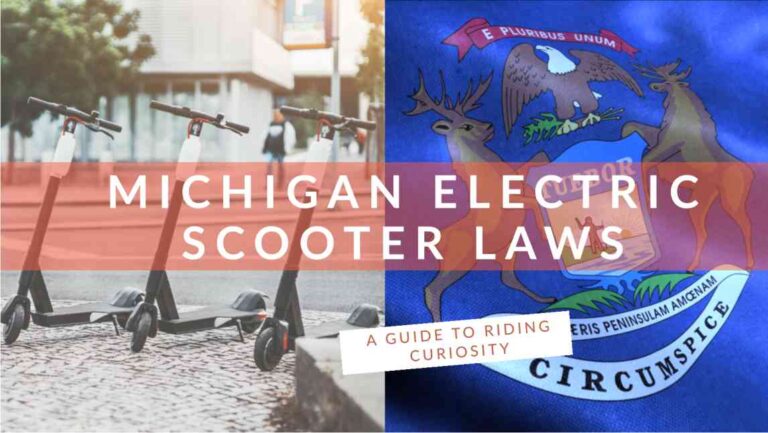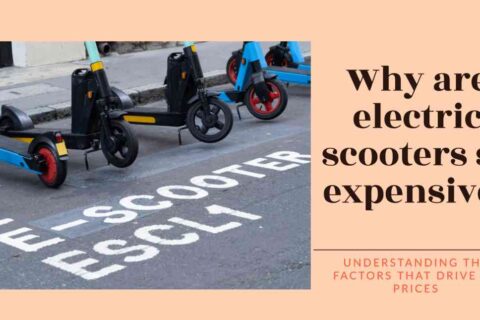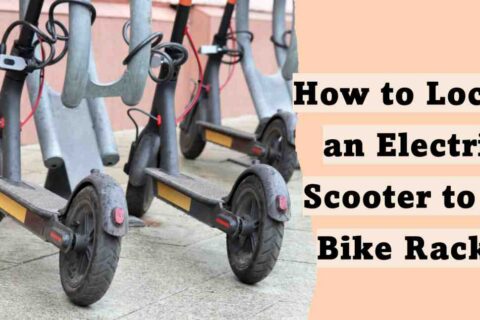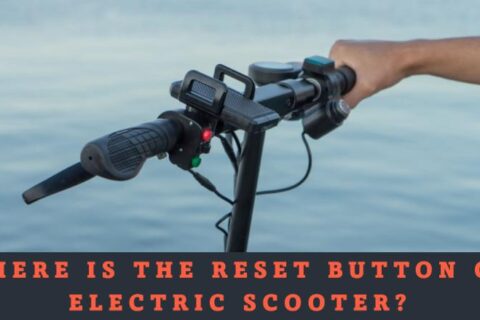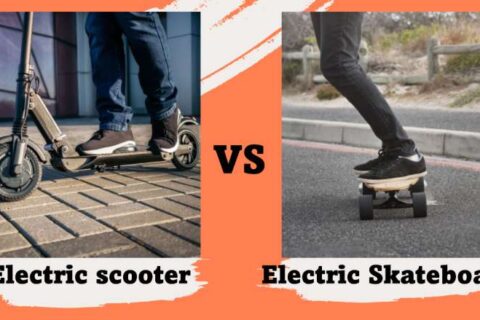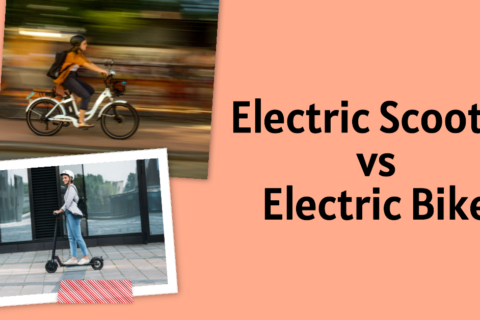As electric scooters become more popular in Michigan’s cities, it’s important for riders to know the Michigan electric scooter laws.
This guide covers Michigan electric scooter laws, including age requirements, licenses, helmet rules, and how to ride safely. Electric scooters have to follow rules about lights, braking, and where you can ride.
We’ll also mention that different cities might have different rules. Keeping up with the rules helps you have safe and legal scooter rides and adds to the city’s mobility scene.
Key Takeaway
| Key Takeaways | Details |
|---|---|
| Key Regulations for Electric Scooter Riders | Riders should stay on the right side, pass through traffic lanes only in specific situations, and use sidewalks while giving pedestrians the right of way. Speed limits and where to ride depending on local rules, with highways and freeways off-limits. |
| Age and Licensing Requirements | Riders must be at least 12 years old. To ride on public roads, a driver’s or chauffeur’s license is required; a moped license is available for those aged 15 and older. Tests and parental consent are necessary for younger riders. |
| Helmet Regulations | Electric scooters can travel up to 25 mph, but this applies to scooters with handlebars. Those without handlebars are mainly for sidewalks or bike lanes. Riders must follow bike rules, use lights, and obey traffic signs. |
| Roadway and Sidewalk Michigan Electric Scooter Laws | Riders should stay on the right side, pass through traffic lanes only in specific situations, and use sidewalks while giving pedestrians the right of way. Speed limits and where to ride depend on local rules, with highways and freeways off-limits. |
| Parking and Docking Guidelines | Electric scooters should follow bike rules for parking. They can be parked on sidewalks, bike racks, or designated spots. Blocking pedestrians or other vehicles is not allowed. Special rules apply to private property parking. |
| Differences in Laws Across Michigan Cities | Different cities have varying rules, fees, and fines for electric scooter operations. For example, Detroit companies pay a yearly permit fee and tax per ride. Lansing has similar requirements. It’s important to stay updated with specific city regulations. |

Table of Contents
ToggleComprehending Michigan Electric Scooter Laws
Michigan electric scooter laws are actually based on the rules for electric skateboards, which were established back in 2018.
According to the Michigan Vehicle Code, an electric skateboard is a kind of wheeled device that you stand on while riding. It can’t be bigger than 60 inches long and 18 inches wide.
The motor on it shouldn’t be more powerful than 2,500 watts, and it shouldn’t go faster than 25 miles per hour. Sometimes, an electric skateboard can even have handlebars, which turns it into an electric scooter.
The rules for electric scooters are pretty much like the ones for bicycles. This means that if you’re riding a scooter, you’ve got to follow the same rules that people on bikes do. But there are also some specific things that only apply to scooters.
These include stuff like how old you need to be to ride one, whether you need a license, wearing a helmet, where you’re allowed to ride, how fast you can go, where you can park, and how the rules can be different in different parts of Michigan.
Key Regulations in Michigan for Electric Scooter Riders
From all the state laws regarding electric scooters, the rules for people using Michigan electric scooter laws can change depending on where they’re riding, how fast they’re going, and what gear they have. Here’s what scooter riders need to remember:
- When it’s dark, electric scooters should have a front light that can be seen from at least 500 feet away. They also need a back reflector or light that’s visible from around 100 feet away.
- Electric scooters must be able to stop within 30 feet if they’re going at 10 miles per hour on a dry and flat road.
- Scooters aren’t usually allowed on sidewalks unless the local rules say so or if it’s for safety.
- Highways and freeways are off-limits for scooters.
- Never ride a scooter if you’re drunk or on drugs.
The tips for riding scooters are a bit like the ones for bicycles:
- Stick to the right side of the road as much as possible.
- Go in the same direction as the cars.
- Follow traffic lights and signs.
- Let pedestrians and other vehicles go first when you need to.
- Show when you’re turning or stopping with your hands.
- Don’t ride in places where drivers can’t see you, and don’t go in and out of traffic.
There are a few more things to keep in mind:
- Don’t ride side by side with more than one person, unless you’re on a path just for bicycles or electric skateboards.
- Don’t carry anything that stops you from having at least one hand on the handlebars.
- Don’t attach yourself or your scooter to any other moving vehicle on the road.

Age and Licensing Requirements in Michigan
Who can ride electric scooters in Michigan and what licenses they need depends on whether the scooter is considered a moped or a motorcycle. Here’s what you need to know about the age and licenses for electric scooters in Michigan:
- You should be at least 12 years old to ride an electric scooter in Michigan.
- To ride your electric scooter on public roads, you need a driver’s license or chauffeur’s license. But if you don’t have either of those, don’t worry! You can get a moped license if you’re 15 or older.
- To get a moped license, you’ll need to do a few things at your local Secretary of State office. Take a vision test, a general knowledge test, and a traffic sign test. You’ll also have to prove who you are. If you’re under 18, your parent or guardian needs to sign for you.
- If you later get a driver’s license or chauffeur’s license, you’ll need to give up your moped license.
Helmet Regulations in Michigan Electric Scooter Laws
In Michigan, electric scooters can go up to 25 mph, but this rule only applies to scooters or skateboards with handlebars.
If the scooter doesn’t have handlebars, it can’t be used on roads with a 25 mph limit, except for crossing. This means scooters without handlebars are mainly for sidewalks or bike lanes.
Electric scooters are seen as electric skateboards in Michigan. They follow bike rules. At night, they should have lights and reflectors. And they need to obey traffic signs, just like bikes.
Roadway and Sidewalk Operation Laws in Michigan about Electric Scooters
As an electric scooter owner, it’s really important to drive carefully and follow these rules when you’re on the road or sidewalk:
Stay on the Right: If you’re riding your electric scooter on a street or road, make sure you stick to the right side. If you can’t, stay as close to the right as you can. Be super careful when other vehicles are coming close to you to keep everyone safe.
No Side by Side: Don’t ride your scooter right next to another one if you’re on a road. But there’s a special exception: you can ride side by side if you’re on a path just for scooters.
Passing Traffic: You usually can’t move through the traffic lanes with your scooter. But there are times when you can:
- On a two-way street, you can pass to the left of cars going your way.
- On a one-way street, you can pass on either the left or the right side.
Sidewalk Rules: You can use sidewalks for your electric scooter, but remember, pedestrians always have the right of way. You should also show when you’re turning or passing people by signaling.

Michigan Electric Scooter Laws on Speed Limits
Where you can ride electric scooters depends on local rules. Usually, you can ride on roads with speed limits up to 25 miles per hour. But some places might not allow it, so it’s good to check.
You can also use bike paths or lanes in most cases unless local rules say otherwise. But using sidewalks isn’t common unless the law or safety reasons allow it.
Remember, highways and freeways are a no-go for scooters.
Some areas might have special signs or marks to show where you can or can’t ride. For instance, in Detroit, scooters can’t go on certain parts of Woodward Avenue. In Lansing, you’re okay on streets with speed limits up to 25 miles per hour, but not on sidewalks downtown or near Michigan State University.
Different rules might apply in places like Ann Arbor or Grand Rapids. In Ann Arbor, you can’t ride in specific parks or close to Michigan Stadium on game days. In Grand Rapids, avoid bridges and streets with speed limits over 25 miles per hour. Also, when it’s snowy, some places don’t let scooters out to keep things safe.
Parking Guidelines in Michigan Electric Scooter Laws
The rules for parking electric scooters in Michigan might not be crystal clear, but here are some tips based on what I found:
- In Michigan, electric scooters are seen as “electric skateboards.” They’re supposed to follow bike rules.
- You can park your electric scooter on sidewalks, bike racks, or spots meant for them. Just make sure you’re not blocking people walking or other vehicles.
- You can’t leave your scooter on streets, highways, or regular parking spots for cars unless it’s attached to a vehicle with a rack or trailer.
- If you want to park on private property, you’ll need the owner’s okay.
- And always remember, to follow the local rules to avoid any issues. Rules can change, so staying up to date is a smart move.

Differences in Laws Across Michigan Cities
You can find the specific rules for each city on their official websites or transportation departments. Here are a few examples:
- In Detroit, companies that offer electric scooters have to pay a yearly permit fee of $2,000 plus $30 for each scooter. Riders also need to pay a 25-cent tax for each ride. Companies have to share data about how the scooters are used and any issues. If you don’t follow the rules, you might get fined up to $500.
- In Lansing, companies have to pay a yearly permit fee of $2,500 plus $50 for each scooter. Riders pay a 10-cent tax per ride. Companies also share data with the city. Breaking the rules can lead to fines of up to $100.
- In Ann Arbor, companies pay a yearly permit fee of $5,000 plus $100 for each scooter. Riders pay a 15-cent tax per ride. Companies also provide data to the city. Not following the rules might mean fines of up to $1,000.
Keep in mind that the rules can change, so it’s a good idea to stay updated with the latest info for the city you’re in.
Frequently Asked Questions (FAQs)
Do I need a license to ride an electric scooter in Michigan?
Yes, you typically need a valid driver’s license or chauffeur’s license to operate an electric scooter on public roads. If you don’t have one, you can apply for a moped license if you’re at least 15 years old.
Are there specific rules for different cities in Michigan?
Yes, electric scooter rules can vary by city. Each city might have different regulations, fees, and penalties. Always check the specific rules for the city you’re in or planning to ride in.
Can I ride my electric scooter on roads with a speed limit of more than 25 mph?
If your electric scooter doesn’t have handlebars, you might not be allowed on roads with a speed limit of 25 mph or more, except for crossing.
Can I ride my electric scooter on highways or freeways?
No, electric scooters are not allowed to operate on highways or freeways in Michigan.
What should I do if I want to park my electric scooter on private property?
You need to get consent from the property owner before parking your electric scooter on private property.
Are there any specific rules for using electric scooters in city centers?
Yes, some cities might have specific rules for using electric scooters in busy city centers. Always check local regulations to know where you can and cannot ride.
Are lights required on electric scooters?
According to Michigan Legislature – Section 257.662, if you’re riding your electric scooter or skateboard on the road between half an hour after sunset and half an hour before sunrise, you need specific lights. You should have a white light in front that others can see from at least 500 feet away. Also, you must have a red reflector at the back that’s visible from 500 feet away, or you can use a red light there too.
Do the laws mention anything about allowing passengers to ride?
Yes, the laws in Michigan for electric scooters (MCL 257.658(3)) say you can’t carry more than one person on a scooter or electric skateboard at a time.
Conclusion
Electric scooters are a cool and handy way to move around in Michigan, but they come with Michigan electric scooter Laws that riders must follow.
If you know and follow these Michigan electric scooter laws, you’ll keep safe and legal while riding.
And by keeping up with any changes in scooter laws, you can adjust to how things are moving in the world of electric scooters.

